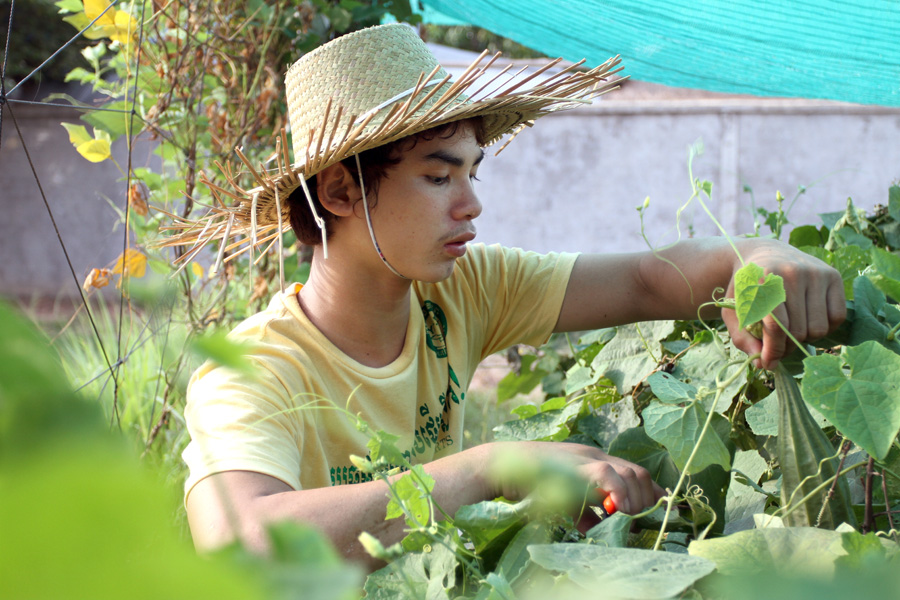
Their former homes have since been demolished to make way for development.
“Until I became involved with the Youth Empowerment Project (YEP), there was no hope and I could not see my future,” said Vannak who left school at 15 to become a construction worker and support his family.
Around the same time, in the hopes of achieving a better life, his parents had borrowed money. So every week he would give most of his daily earnings 12,000 Riels ($3) to them.
Before Vannak’s supplementary income, his mother was the breadwinner. In better times, her fruit business provided for the family, but with a 15km distance to cover with a fruit cart, she would return home exhausted.
Vannak said that after working just one day, she was often too sick to work the next day. So his father, who was ill with high blood pressure, found work as a guard; his low wage barely getting them by.
Although Vannak was working hard and helping his family, he felt a sense of hopelessness and could not see a future.
He felt that if he stayed on this path, he could end up drinking alcohol and gambling in a youth gang.
“Adults thought I was useless and that I could not do anything because I was small. However, they sometimes praised me as a good boy because I was helping my parents pay off debt,” said Vannak.
In Cambodia, 26 per cent of the population is aged between 15 and 25 years old and youth in vulnerable situations find it difficult to change both their situation and their place in society.
Viewed as second class citizens by many in Cambodia, Andong youth often experience discrimination.
“There must be made available to all … everything necessary for leading a life truly human, such as food, clothing, and shelter … the right to education, to employment.” – Pope Paul VI, Gaudium et Spes 26
In response, YEP, which is run by Caritas Australia’s partner, Youth for Peace, was designed to provide life skills and vocational training such as handicrafts, gardening and small business management.
Their goal is to increase youth employment, as well as build a sense of responsibility and solidarity in youth.
Vannak heard about the project, so he decided to give it a go. As his parents were dependent on his extra income, initially they were apprehensive.
However, when Vannak told them he could earn an income through skills learnt at YEP, they understood the importance. This was a chance for the family to be free from poverty.
At first, Vannak wasn’t focused on learning; he was so hungry that what he most looked forward to was eating the food provided. But it didn’t take long for his hunger to grow for something else – learning; in particular, silk screen printing and gardening.
“The goal of the project is very clear and helpful, it is like our Godmother. It has shaped our thinking and provided us with skills to improve our living conditions.”
Now a team leader of six silk screen printers, Vannak feels good knowing he is helping others. Plus, for every silk screen order, he can now earn up to 40,000 Riels ($10).
He is also the leader of the vegetable garden which grows produce for the organisation and members’ families.
Every dollar Vannak earns pays for his study (he has since returned to school) and supports his family. Although the income isn’t regular, it is work that he loves to do.
“I started to learn new things and those new things significantly changed my perception about the project and my personal life,” he said.
“On behalf of the youth in Andong Village, I would like to thank the Australian people for their generosity and continuing support. I wish them good health.”
Your donation to Caritas Australia’s Project Compassion supports long-term partnerships for justice and transformation in more than 30 countries around the world.
To donate, support or fundraise for Project Compassion 2013, please visit our website at www.caritas.org.au/projectcompassion or phone 1800 024 413.